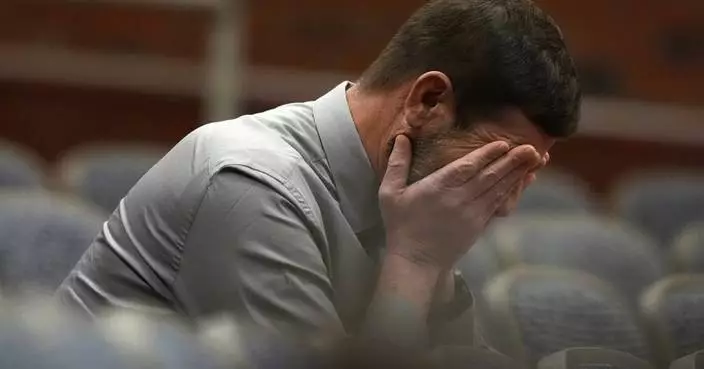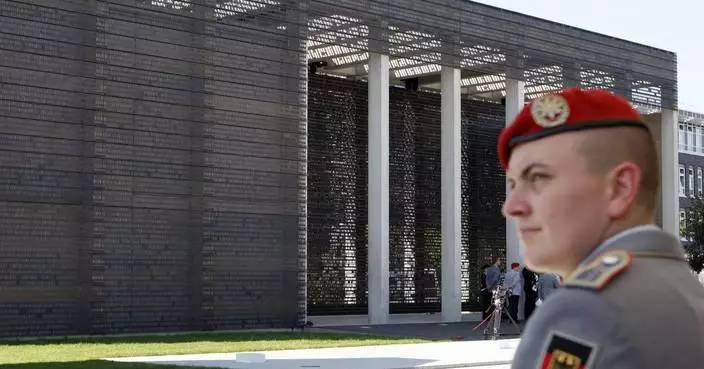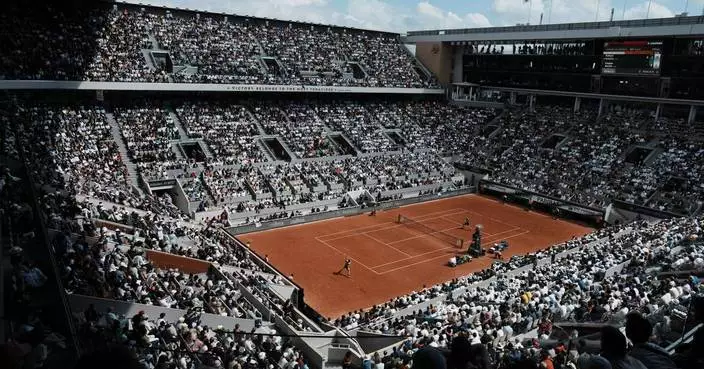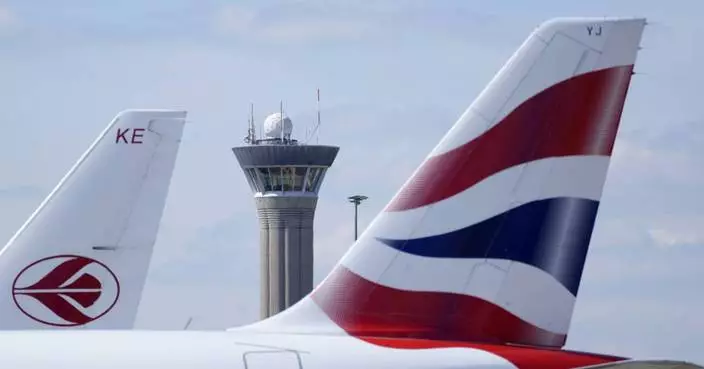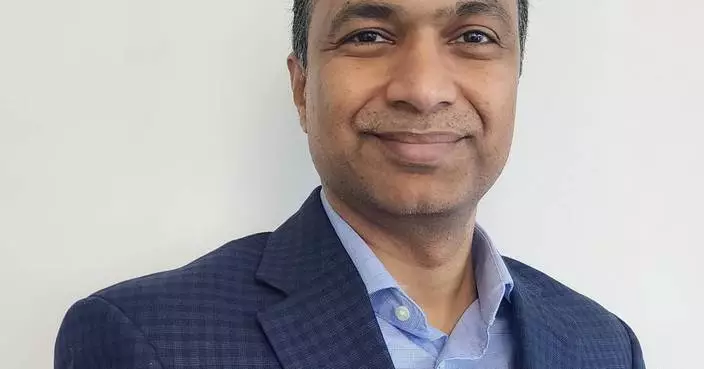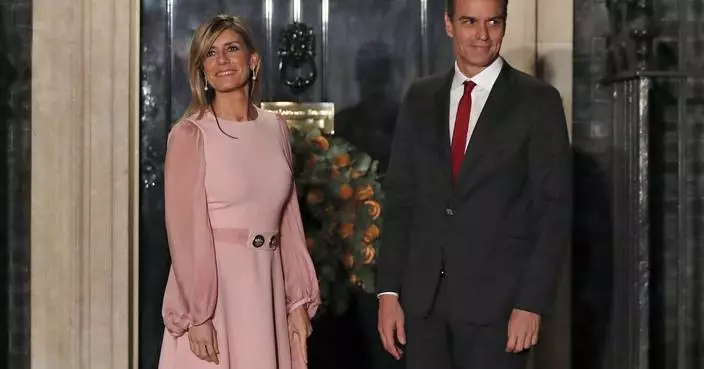The tears welling in the Paris mayor's eyes told the story one way. The words the Los Angeles mayor spoke told it another.
This was one of those rare Olympic moments when everyone walked away a winner.
Click to Gallery
The tears welling in the Paris mayor's eyes told the story one way. The words the Los Angeles mayor spoke told it another.
Paris for 2024. Los Angeles for 2028. And the International Olympic Committee for transforming its unruly, tension-filled and sometimes corrupt bidding process into a history-making, two-city victory that secures the future of the Games for the next 11 years.
Different, as in the first time the IOC has granted two Summer Olympics at once. And different, in that there was no need for a secret ballot or any last-minute, back-room deal making. This result came after a year's worth of scrambling by IOC president Thomas Bach, who had only the two bidders left for the original prize, 2024, and couldn't afford to see either lose.
"It was a very strong, very emotive moment," Hidalgo said. "We are all united. Altogether, it's very special for us, because in France, and in other countries, that's not usual."
Los Angeles moved to 2028, and those Olympics will halt a stretch of 32 years without a Summer Games in the United States. In exchange for the compromise, LA will grab an extra $300 million or more that could help offset the uncertainties that lie ahead over an 11-year wait instead of seven.
Meanwhile, in the Lima exhibition hall, the California-cool LA delegation wore sneakers to the presentation, and was going to forego neckties, too, before thinking better of it.
The public in many cities is no longer keen to approve blank checks for bid committees and governments that have to come up with the millions simply to bid for the Olympics, then billions more to stage them if they win.
Los Angeles, meanwhile, will get an extra four years that Garcetti insists is hardly needed. Los Angeles proposed a $5.3 billion budget for 2024 (to be adjusted for 2028) that included infrastructure, operational costs — everything. A big number, indeed, though it must be put into perspective: Earlier this summer, organizers in Tokyo estimated their cost for the 2020 Games at $12.6 billion.
.jpg.webp)
International Olympic Committee President Thomas Bach speaks during the opening IOC session in Lima, Peru, Wednesday, Sept. 13, 2017. (AP Photo/Martin Mejia)
Paris for 2024. Los Angeles for 2028. And the International Olympic Committee for transforming its unruly, tension-filled and sometimes corrupt bidding process into a history-making, two-city victory that secures the future of the Games for the next 11 years.
"This is a pretty radical revolution today," LA mayor Eric Garcetti said. "Usually, we have two or three cities crying in a corner, and one glorious victory. In this world, there are enough losers today, enough people who go after dreams to have them crushed. Today, we model something that can be different."

Paris Mayor Anne Hidalgo addresses a session by the International Olympic Committee (IOC) in Lima, Peru, Wednesday, Sept. 13, 2017. (AP Photo/Martin Mejia)
Different, as in the first time the IOC has granted two Summer Olympics at once. And different, in that there was no need for a secret ballot or any last-minute, back-room deal making. This result came after a year's worth of scrambling by IOC president Thomas Bach, who had only the two bidders left for the original prize, 2024, and couldn't afford to see either lose.
There was no drama — the decision had been locked in for more than a month. But to say there was no emotion would not be true.
After Bach called for a show of hands to approve the dual award, dozens of arms shot skyward from the audience; moments later, Paris mayor Anne Hidalgo stood next to the IOC president dabbing tears from her eyes.
.jpg.webp)
Paris Mayor Anne Hidalgo, left, speaks with Los Angeles Mayor Eric Garrett at the end of an IOC session in Lima, Peru, Wednesday, Sept. 13, 2017. (AP Photo/Martin Mejia)
"It was a very strong, very emotive moment," Hidalgo said. "We are all united. Altogether, it's very special for us, because in France, and in other countries, that's not usual."
Moments after the vote, Bach handed cards with the winners' names on them to Hidalgo and Garcetti. One read "Paris 2024," and the other "LA 2028." It was a mere formality, yet both mayors held them aloft with wide smiles on their faces.
Both cities will host their third Olympics.
The Paris Games will come on the 100th anniversary of its last turn. That milestone, plus the fact that Paris has been on the losing end of these bids for 1992, 2008 and 2012, would have made the French capital the sentimental favorite had only 2024 been up for grabs.
.jpg.webp)
Los Angeles Mayor Eric Garcetti, left, celebrates with United States Olympic Committee Executive Officer Scott Blackmun at the end of the IOC session in Lima, Peru, Wednesday, Sept. 13, 2017. (AP Photo/Martin Mejia)
Los Angeles moved to 2028, and those Olympics will halt a stretch of 32 years without a Summer Games in the United States. In exchange for the compromise, LA will grab an extra $300 million or more that could help offset the uncertainties that lie ahead over an 11-year wait instead of seven.
"We're ready now," Garcetti insisted, speaking of a city that has virtually every sports venue already in place.
Without any nail-biting conclusion to see, the post-vote celebration at the Eiffel Tower was a sparsely attended near rain-out. Los Angeles held a small event with Olympians Nastia Liukin and John Naber standing beneath the blazing Olympic cauldron at the famous LA Coliseum, but it was mostly media, and no fans.
.jpg.webp)
International Olympic Committee President Thomas Bach speaks during the opening IOC session in Lima, Peru, Wednesday, Sept. 13, 2017. (AP Photo/Martin Mejia)
Meanwhile, in the Lima exhibition hall, the California-cool LA delegation wore sneakers to the presentation, and was going to forego neckties, too, before thinking better of it.
In this never-before-seen style of selection, Bach asked the 94 IOC members to allow the real contests to play out at the Olympics themselves and transform the vote from a game of sorts into a pure business decision.
It wasn't such a bad idea considering the news still seeping out about a bid scandal involving a Brazilian IOC member's alleged vote-selling to bring the 2016 Olympics to Rio de Janeiro.
More than that, Bach needed to ensure stability for his brand.
.jpg.webp)
International Olympic Committee (IOC) President Thomas Bach stands between Paris Mayor Anne Hidalgo, left, and Los Angeles Mayor Eric Garrett at the end of the IOC session in Lima, Peru, Wednesday, Sept. 13, 2017. (AP Photo/Martin Mejia)
The public in many cities is no longer keen to approve blank checks for bid committees and governments that have to come up with the millions simply to bid for the Olympics, then billions more to stage them if they win.
That reality hit hard when three of the original five bidders for 2024 — Rome, Hamburg, Germany, and Budapest, Hungary — dropped out, and the U.S. Olympic Committee had to pull the plug on its initial candidate, Boston, due to lack of public support.
"This is a solution to an awkward problem," said longtime IOC member Dick Pound of Canada.
It was solved by Paris and Los Angeles, two cities with a storied tradition of Olympic hosting and an apparent understanding of Bach's much-touted reform package, known as Agenda 2020. It seeks to streamline the Games, most notably by eliminating billion-dollar stadiums and infrastructure projects that have been underused, if used at all, once the Olympics leave town.
.jpg.webp)
Paris Mayor Anne Hidalgo, center, speaks with Los Angeles Mayor Eric Garrett, right, and Los Angeles International Olympic Committee member Anita DeFrantz, left, at the end of the IOC session in Lima, Peru, Wednesday, Sept. 13, 2017. (AP Photo/Martin Mejia)
Can they deliver?
Paris will have the traditional seven-year time frame to answer that.
Only one totally new venue is planned — a swimming and diving arena to be built near the Stade de France, which will serve as the Olympic stadium. In all, the projected cost of new venues and upgrades to others is $892 million.
To be sure, Paris already has much to work with. Beach volleyball will be played near the Eiffel Tower; cycling will finish at the Arc de Triomphe; equestrian will be held at the Chateau de Versailles. And what would an Olympics be without some water-quality issues? There will be pressure to clean up the River Seine, which is where open-water and triathlon will be held.
.jpg.webp)
France's National Olympic Committee President Denis Masseglia, right, fist bumps Youssef Halaoua, representative of France's "Generation 2024" during their presentation to the International Olympic Committee (IOC) in Lima, Peru, Wednesday, Sept. 13, 2017.(AP Photo/Martin Mejia)
Los Angeles, meanwhile, will get an extra four years that Garcetti insists is hardly needed. Los Angeles proposed a $5.3 billion budget for 2024 (to be adjusted for 2028) that included infrastructure, operational costs — everything. A big number, indeed, though it must be put into perspective: Earlier this summer, organizers in Tokyo estimated their cost for the 2020 Games at $12.6 billion.
Traffic could be a problem — it almost always is in LA — but the city will be well along in its multi-decade, multibillion-dollar transit upgrade by 2028. Those with long memories recall free-flowing highways the last time the Olympics came to town, as locals either left the city or heeded warnings to use public transportation or stay home.
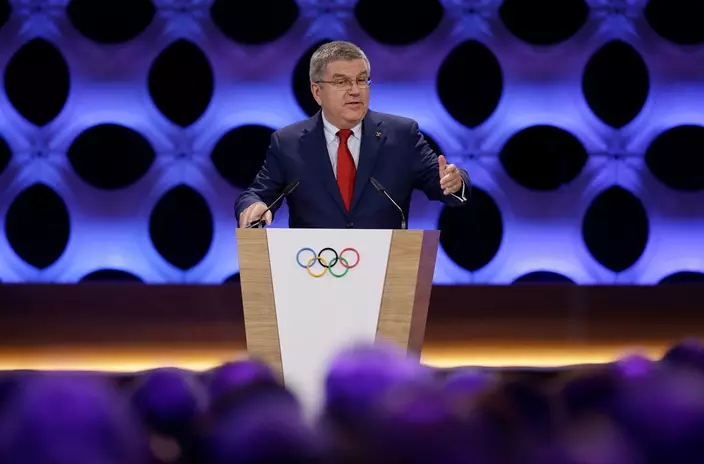
International Olympic Committee President Thomas Bach speaks during the opening IOC session in Lima, Peru, Wednesday, Sept. 13, 2017. (AP Photo/Martin Mejia)
Those 1984 Games essentially saved the Olympic movement after a decade of terror, red ink and a boycott sullied the brand and made hosting a burden. The city points to its Olympic legacy to explain a nearly unheard-of 83 percent approval rating in a self-commissioned poll — not an insignificant factor when the IOC picks a place to bring its crown-jewel event.
Along with Paris, LA is stepping in again to try to change the conversation about what hosting the Olympics can really be.
"I think it's a very positive message about the value of the Olympic movement and the value of the Olympic Games," said Sergei Bubka, the Olympic champion pole vaulter, who is an honorary member of the IOC. "I think we're going in the right direction."
WASHINGTON (AP) — The U.S. Supreme Court on Thursday took up Donald Trump's bid to avoid prosecution over his efforts to overturn his 2020 election loss to Democrat Joe Biden.
Trump’s lawyers argue that former presidents are entitled to absolute immunity for their official acts. Otherwise, they say, politically motivated prosecutions of former occupants of the Oval Office would become routine and presidents couldn’t function as the commander in chief if they had to worry about criminal charges.
Lower courts have rejected those arguments, including a unanimous three-judge panel on an appeals court in Washington. And even if the high court resoundingly follows suit, the timing of its decision may be as important as the outcome.
That’s because Trump, the presumptive 2024 Republican presidential nominee, has been pushing to delay the trial until after the November election, and the later the justices issue their decision, the more likely he is to succeed.
The court typically issues its last opinions by the end of June, which is roughly four months before the election.
Currently:
— What to listen for during Supreme Court arguments on Donald Trump and presidential immunity
— The Supreme Court will decide whether Trump is immune from federal prosecution. Here’s what’s next
— What to know in the Supreme Court case about immunity for former President Trump
— Trump is in New York for the hush money trial while the Supreme Court hears his immunity case in DC
— Follow the AP’s coverage of the U.S. Supreme Court at https://apnews.com/hub/us-supreme-court
Here's the latest:
Arguments before the U.S. Supreme Court have ended after more than 2 1/2 hours in Donald Trump’s bid to avoid prosecution over his efforts to overturn his 2020 election loss to Joe Biden.
The arguments had been scheduled to last for an hour but ran more than double the allotted time.
The case delved deep into the nuances of immunity, and key questions of when the high court might rule remain unclear.
The court usually releases its opinions by the end of June, and the timing of the ruling could be as important as the outcome.
At least five justices appeared likely to reject the claim of absolute immunity, but some also suggested that former presidents might have some immunity.
If their ruling reflects that and requires lower courts to then sort out whether immunity applies to Trump, it could push the trial past the November election.
The Supreme Court justices are keenly aware their decision on whether former commanders in chief have immunity will have huge implications not just for this case, but also far beyond this prosecution.
During arguments Thursday in Donald Trump’s bid to avoid prosecution over his efforts to overturn his 2020 election loss, Justice Neil Gorsuch told special counsel team lawyer Michael Dreeben they are “writing a rule for the ages.”
Justice Brett Kavanaugh concurred, adding: “This case has huge implications for the presidency, for the future of the presidency, for the future of the country.”
Dreeben is working hard throughout the arguments to make clear that a prosecution in this case would not open the floodgates to other criminal charges against future ex-presidents.
In response to a question about drone strikes authorized by former President Barack Obama, Dreeben said the U.S. government already analyzed that fact pattern and concluded that there was “no risk of prosecution for that course of activity.”
As Supreme Court arguments over immunity for Donald Trump stretched near the two-hour mark Thursday, special counsel team attorney Michael Dreeben got to the heart of the government’s case.
He ticked through the acts Trump is charged with, including a slate to elevate fake electors in battleground states, that he said were undertaken in Trump’s status as a presidential candidate and not a president.
Dreeben did, however, note that Trump’s interactions with Justice Department officials in his administration were perhaps protected acts.
The justices appeared highly skeptical of Trump’s claims of absolute immunity, but with arguments still underway, the essential question of when they might decide the case remains unclear.
The timing of their ruling could be as important as the outcome. At least five justices appeared likely to reject the claim of absolute immunity, but some also suggested that former presidents might have some immunity.
If their ruling reflects that and requires lower courts to then sort out whether immunity applies to Trump, it could push the trial past the November election. The court usually releases opinions by the end of June.
In oral arguments that have involved a lot of elevated legal jargon, the Supreme Court justices also sneaked in a few fun metaphors Thursday during Donald Trump’s bid to avoid prosecution over his efforts to overturn his 2020 election loss to Joe Biden.
Striking a skeptical note while questioning Trump lawyer D. John Sauer, Chief Justice John Roberts argued that expunging from the indictment acts that are official rather than personal would hobble the case, making it a “one-legged stool.”
Later, in conversation with special counsel team lawyer Michael Dreeben, Justice Samuel Alito brought up “the old saw about indicting a ham sandwich.” He was referring to the belief that indictments are easy to secure, and that they don’t necessarily indicate any likelihood of guilt.
Alito asked Dreeben whether he had come across a lot of cases in which a federal prosecutor wanted to indict a case and the grand jury refused. Dreeben said there are such cases, before Alito cut him off.
“Every once in a while there’s an eclipse, too,” Alito said, drawing some laughs in the courtroom.
The team under Special Counsel Jack Smith, which wrote that a lack of previous criminal charges “underscores the unprecedented nature” of what Donald Trump is accused of, is up before the Supreme Court in Trump's bid to avoid prosecution over his efforts to overturn his 2020 election loss to Democrat Joe Biden.
Michael Dreeben, a lawyer for the Smith team, said the court has never before recognized absolute immunity for a former president. “Such presidential immunity,” he said, “has no foundation in the Constitution.”
Justice Clarence Thomas asked Dreeben whether he was saying that there was no immunity even for official acts.
Dreeben said yes and also that impeachment and conviction before the Senate is not a prerequisite for a courtroom prosecution. Dreeben said there are plenty of checks to prevent politically motivated prosecutions.
Thomas said that other presidential acts in the past would have seemed ripe for prosecution and yet none occurred. Dreeben responded that the core distinction is that those other acts were not crimes.
Dreeben said the Smith team was not endorsing a system in which presidents would be exposed to prosecution for mistakes or bad judgments.
Justice Neil Gorsuch posed a line of questions Thursday that appeared friendly to arguments by Trump's lawyers in his bid to avoid prosecution over his efforts to overturn his 2020 election loss to Democrat Joe Biden.
Gorsuch suggested that if presidents fear they could be prosecuted after they leave office, they could begin preemptively pardoning themselves.
“We’ve never answered whether a president can do that. And happily, it’s never been presented to us,” he said.
But Justice Amy Coney Barrett took issue with a key argument of the Trump team — that under the Constitution, former presidents must be impeached and convicted before the Senate before they can be prosecuted in court.
Barrett said no one has ever suggested the justices would need to be impeached and convicted before they could be prosecuted. Trump lawyer D. John Sauer responded that under the Constitution, the sequence is only mandatory as it relates to former presidents.
Some Supreme Court justices posed scenarios or expressed skepticism Thursday as arguments started in Donald Trump’s bid to avoid prosecution over his efforts to overturn his 2020 election loss to Democrat Joe Biden.
Conservative Justice Samuel Alito said he considered it “implausible” that a president could legally order Navy SEALs to order the assassination of a political rival. That skepticism matters because the hypothetical is something the Trump team, which includes attorney D. John Sauer, has suggested could theoretically be protected from prosecution.
Conservative Justice Amy Coney Barrett asked Sauer a question that cut to the heart of the case, reading aloud allegations from the indictment and asking him to respond whether Trump’s actions in each instance were private or official.
Trump’s attorneys concede that immunity does not extend to personal actions but instead protects official acts. Sauer said he believed most of the acts are unquestionably official.
Chief Justice John Roberts, who could be a key swing vote, struck a skeptical note about the idea of expunging from the indictment acts that are official rather than personal, saying such a move would render the case a “one-legged stool.”
Liberal Justice Ketanji Brown Jackson said Sauer was asking for a change in the immunity law. She raised Richard Nixon’s pardon, asking, “I think that if everybody thought that presidents couldn’t be prosecuted, then what was that about?"
Liberal Justice Elena Kagan noted the Founding Fathers did not insert an immunity clause for presidents into the Constitution — but, she said, “they knew how to.”
Supreme Court Justice Clarence Thomas pressed Donald Trump's lawyer D. John Sauer at the outset of arguments Thursday, asking where the principle of absolute immunity comes from.
The question was the first during arguments at the Supreme Court in Trump’s bid to avoid prosecution over his efforts to overturn his 2020 election loss to Democrat Joe Biden.
Sauer fell back quickly on a Supreme Court case that’s core to the defense — a 1982 decision that held that former presidents are immune from civil lawsuits.
A skeptical Justice Sonia Sotomayor pointedly noted to Sauer that the indictment alleges that Trump acted for personal gain.
She said the Founding Fathers had contemplated the idea of immunity for presidents but had explicitly decided against it.
She made clear her opposition to the Trump legal team’s position, saying she was having a hard time envisioning immunity for a president who creates and submits false documents, orders the assassination of a political rival, and any number of other criminal acts.
First up on Thursday was D. John Sauer, making Donald Trump’s argument that he’s immune from criminal prosecution. A former Missouri solicitor general and onetime Supreme Court clerk, Sauer also represented Trump at the appeals court level.
Trump went to those arguments even though he wasn’t required to be there, but he won’t be in the audience at the Supreme Court today. He’s required to be in New York for his hush money trial.
About 30 demonstrators gathered outside the Supreme Court before arguments, some wearing judicial robes with kangaroo masks and others holding signs like “Justice Delayed Is Justice Denied.” That’s an apparent reference to the the timing of the high court’s ultimate decision in the case, which could determine whether a trial can be held before the election in November.
Shortly before arguments were slated to begin, Trump fired off a few posts Thursday on his social media network.
In one, he declared in all caps, “WITHOUT PRESIDENTIAL IMMUNITY, IT WOULD BE IMPOSSIBLE FOR A PRESIDENT TO PROPERLY FUNCTION, PUTTING THE UNITED STATES OF AMERICA IN GREAT AND EVERLASTING DANGER!”
Trump also said that without immunity, a president would just be “ceremonial” and the opposing political party “can extort and blackmail the President by saying that, ‘if you don’t give us everything we want, we will Indict you for things you did while in Office,’ even if everything done was totally Legal and Appropriate.”
Of the nine justices hearing the case, three were nominated by Trump — Amy Coney Barrett, Neil Gorsuch and Brett Kavanaugh. But it’s the presence of a justice confirmed decades before Trump’s presidency, Justice Clarence Thomas, that’s generated the most controversy.
Thomas’s wife, Ginni Thomas, urged the reversal of the 2020 election results and then attended the rally that preceded the Capitol riot. That has prompted calls for the justice to step aside from several court cases involving Trump and Jan. 6.
But Thomas has ignored the calls, taking part in the unanimous court decision that found states cannot kick Trump off the ballot as well as last week’s arguments over whether prosecutors can use a particular obstruction charge against Capitol riot defendants.
The justices will probably meet in private a short time after arguments to take a preliminary vote on the outcome. Chief Justice John Roberts would be a prime candidate to take on the opinion for the court, assuming he is in the majority.
They could simply reject Trump’s immunity claim outright, permitting the prosecution to move forward and returning the case to U.S. District Judge Tanya Chutkan to set a trial date.
They could also reverse the lower courts by declaring for the first time that former presidents may not be prosecuted for conduct related to official acts during their time in office. Such a decision would stop the prosecution in its tracks.
There are other options, too, including ruling that former presidents do retain some immunity for their official actions but that, wherever that line is drawn, Trump’s actions fall way beyond it.
Yet another possibility is that the court sends the case back to Chutkan with an assignment to decide whether the actions Trump is alleged to have taken to stay in power constitute official acts.
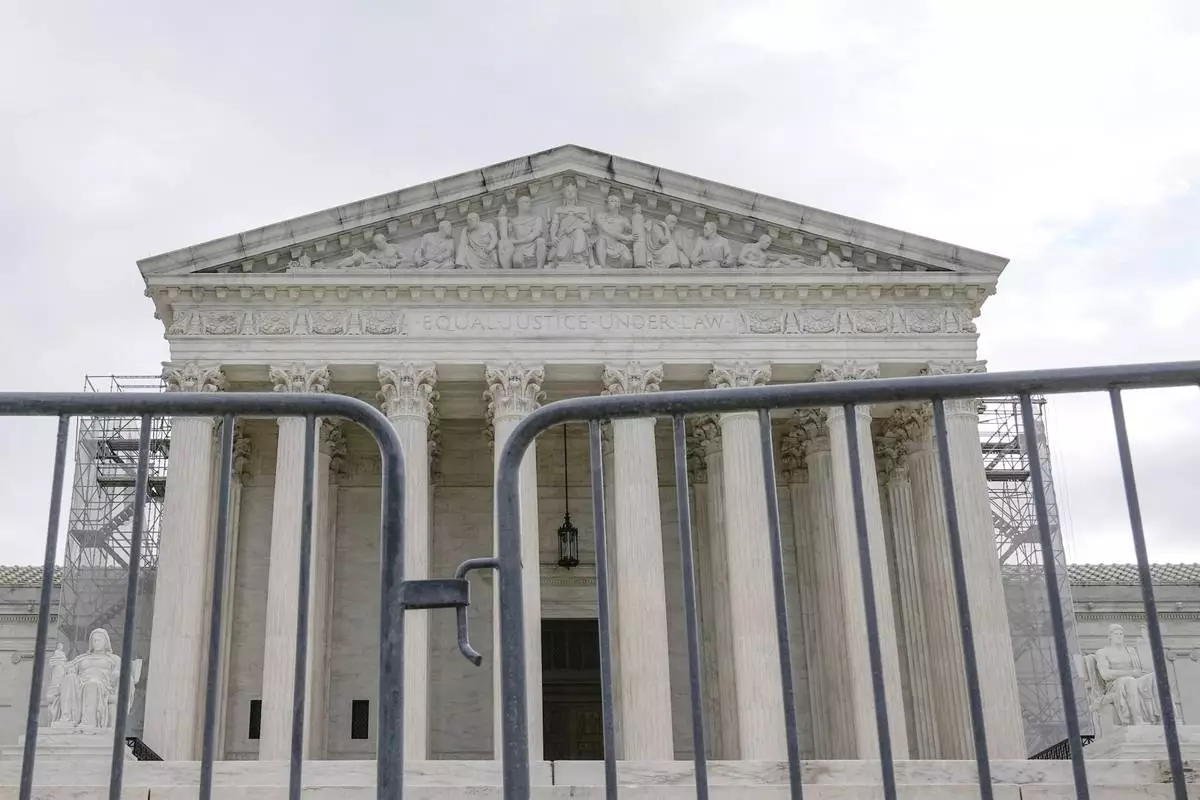
The Supreme Court is seen during a protest outside the as the justices prepare to hear arguments over whether Donald Trump is immune from prosecution in a case charging him with plotting to overturn the results of the 2020 presidential election, on Capitol Hill Thursday, April 25, 2024, in Washington. (AP Photo/Mariam Zuhaib)
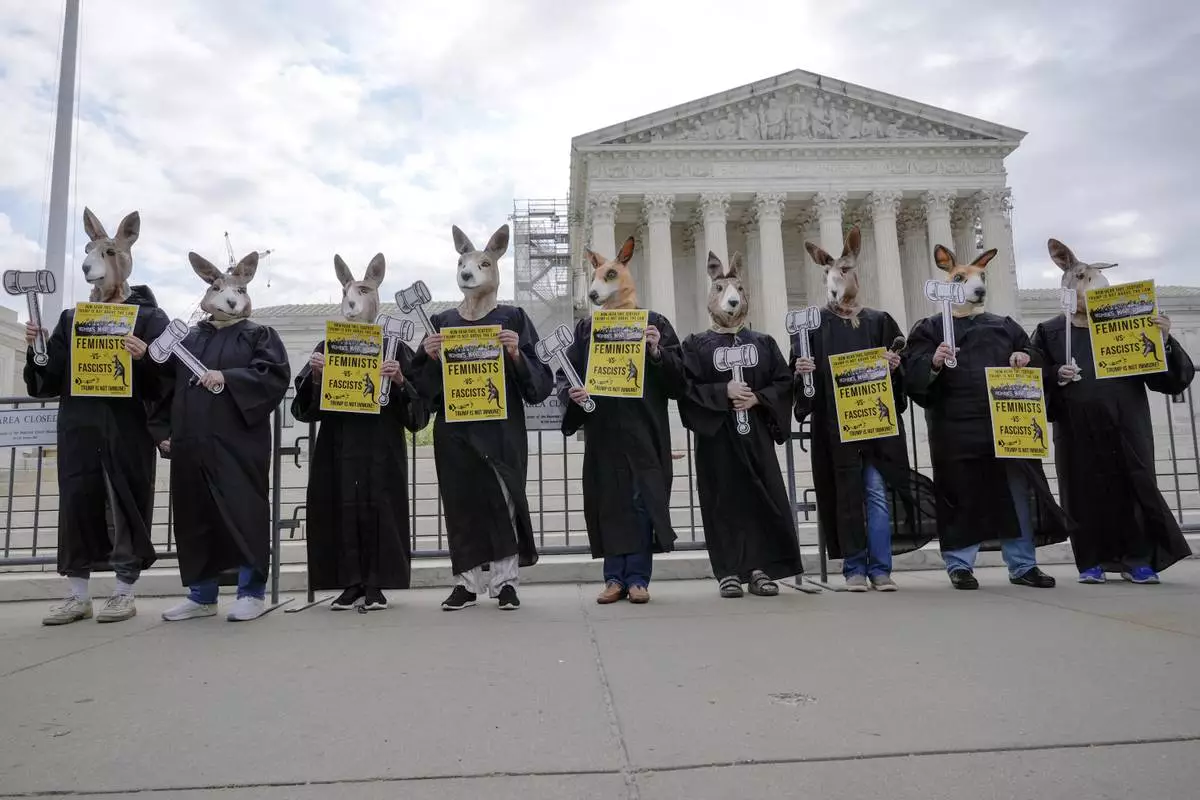
Demonstrators stand outside the Supreme Court as the justices prepare to hear arguments over whether Donald Trump is immune from prosecution in a case charging him with plotting to overturn the results of the 2020 presidential election, on Capitol Hill Thursday, April 25, 2024, in Washington. (AP Photo/Mariam Zuhaib)
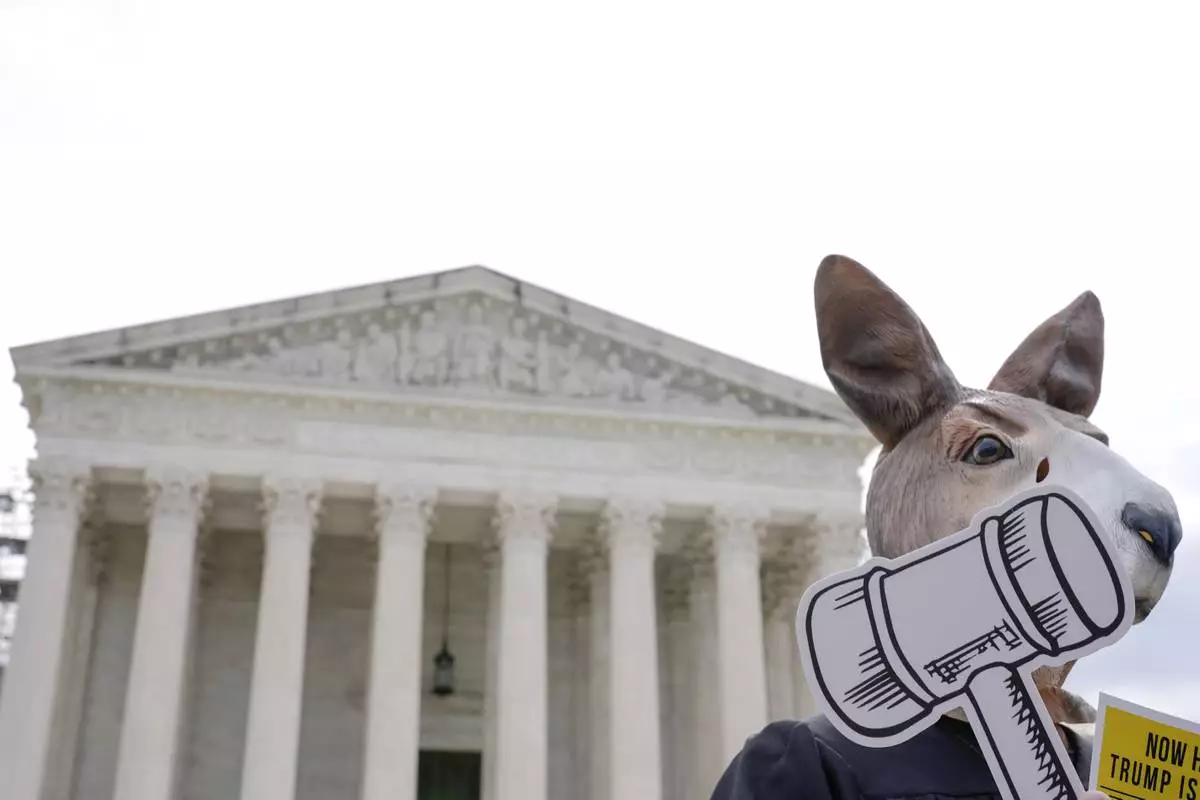
A demonstrator stands outside the Supreme Court as the justices prepare to hear arguments over whether Donald Trump is immune from prosecution in a case charging him with plotting to overturn the results of the 2020 presidential election, on Capitol Hill Thursday, April 25, 2024, in Washington. (AP Photo/Mariam Zuhaib)
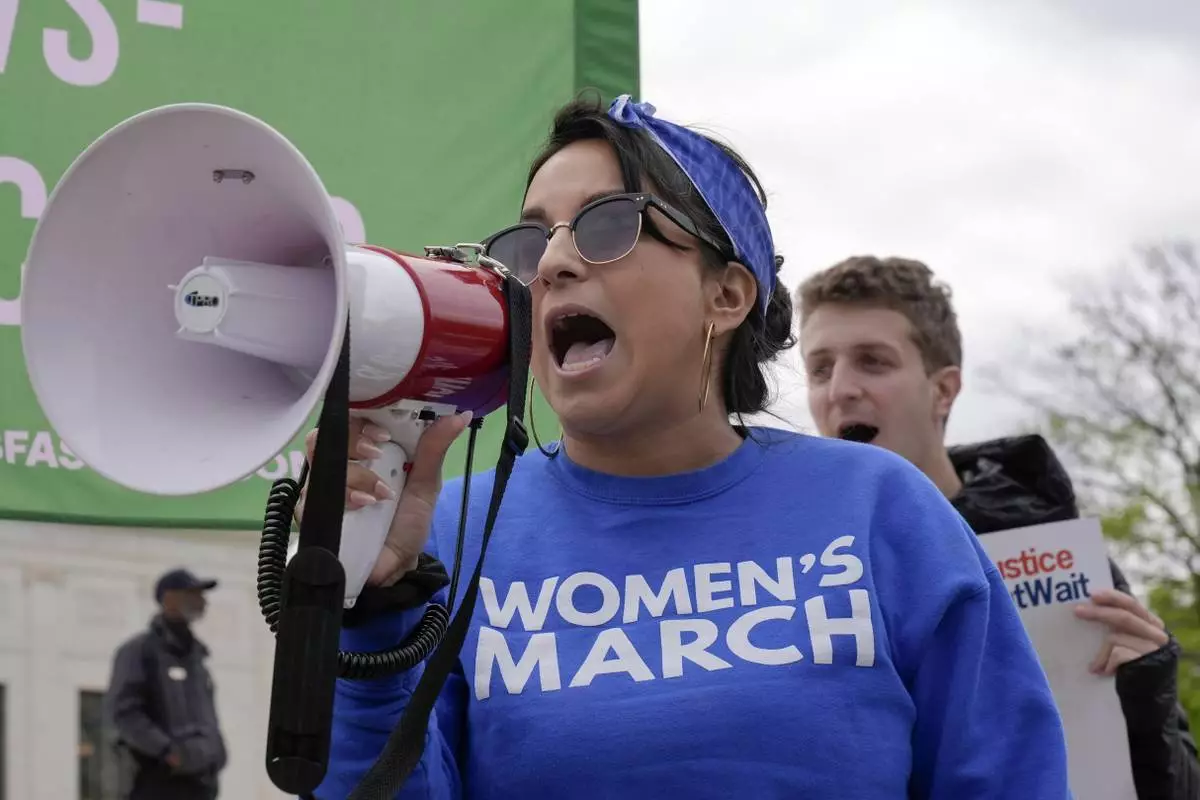
Demonstrators protest outside the Supreme Court as the justices prepare to hear arguments over whether Donald Trump is immune from prosecution in a case charging him with plotting to overturn the results of the 2020 presidential election, on Capitol Hill Thursday, April 25, 2024, in Washington. (AP Photo/Mariam Zuhaib)
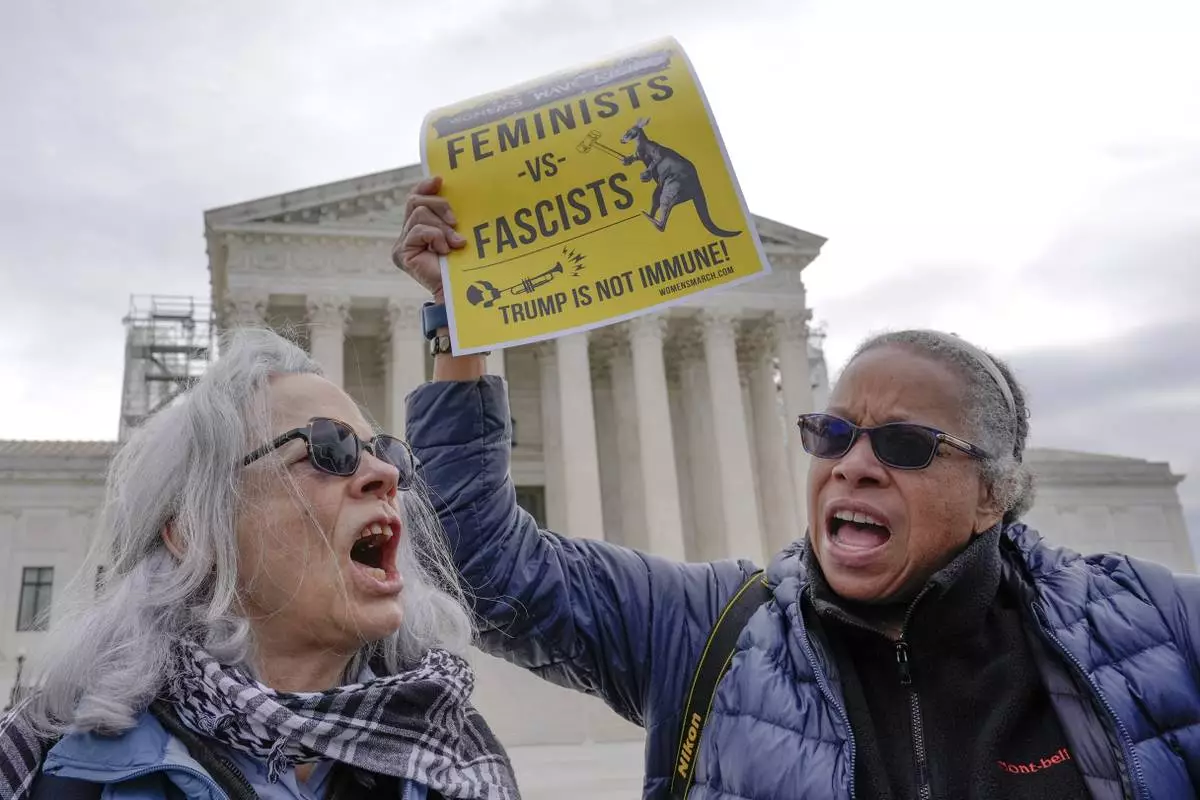
Demonstrators protest outside the Supreme Court as the justices prepare to hear arguments over whether Donald Trump is immune from prosecution in a case charging him with plotting to overturn the results of the 2020 presidential election, on Capitol Hill Thursday, April 25, 2024, in Washington. (AP Photo/Mariam Zuhaib)
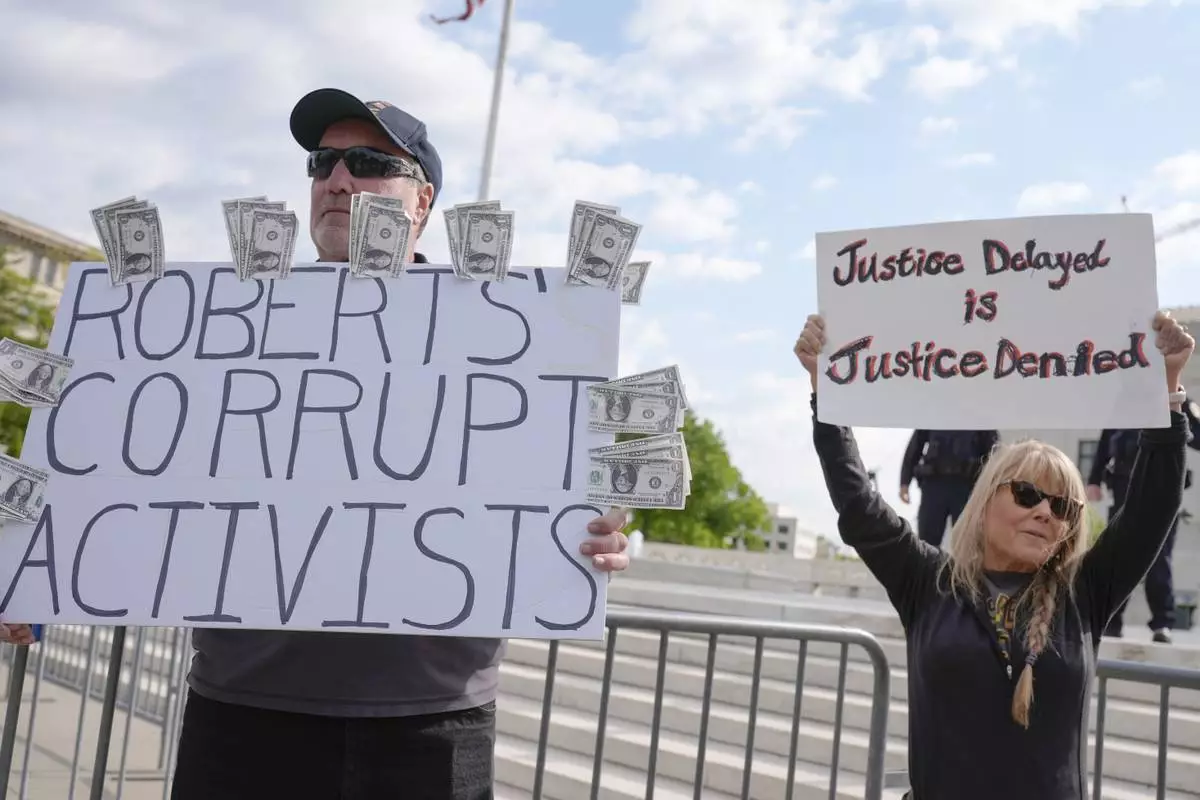
Demonstrates stand outside the Supreme Court as the justices prepare to hear arguments over whether Donald Trump is immune from prosecution in a case charging him with plotting to overturn the results of the 2020 presidential election, on Capitol Hill Thursday, April 25, 2024, in Washington. (AP Photo/Mariam Zuhaib)
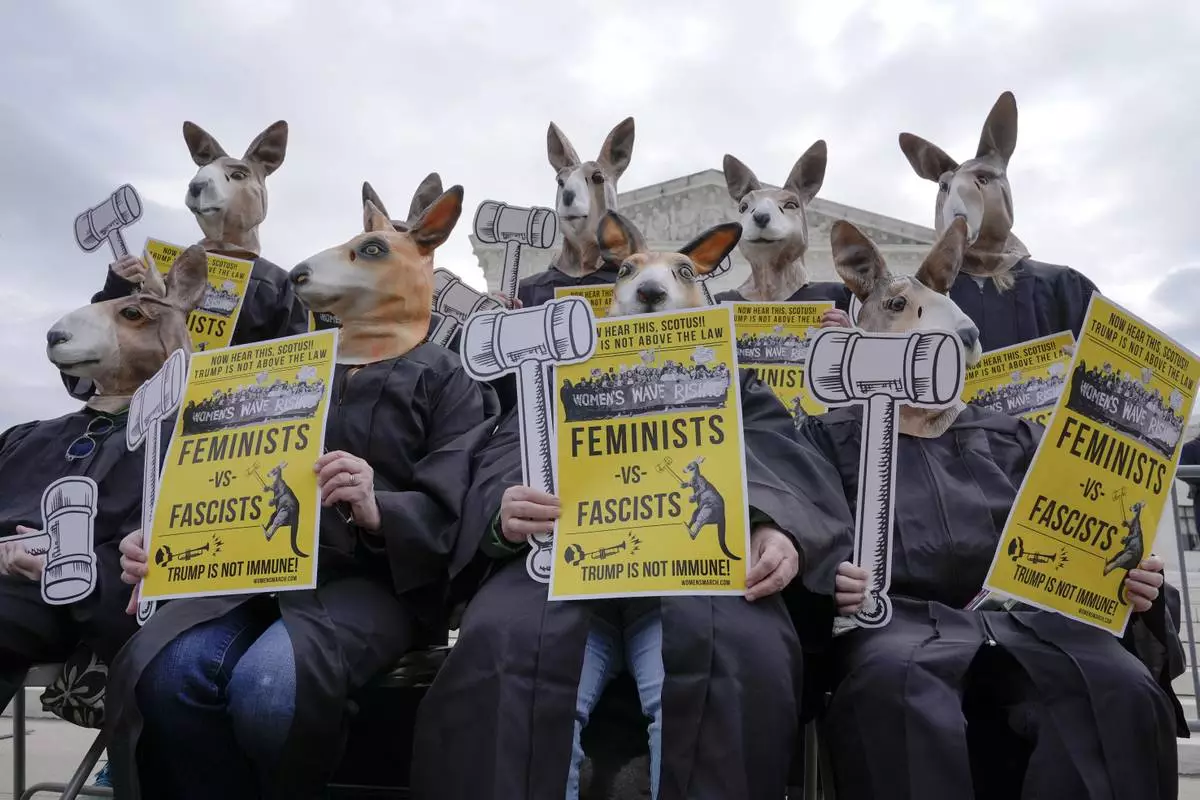
Demonstrates stand outside the Supreme Court as the justices prepare to hear arguments over whether Donald Trump is immune from prosecution in a case charging him with plotting to overturn the results of the 2020 presidential election, on Capitol Hill Thursday, April 25, 2024, in Washington. (AP Photo/Mariam Zuhaib)
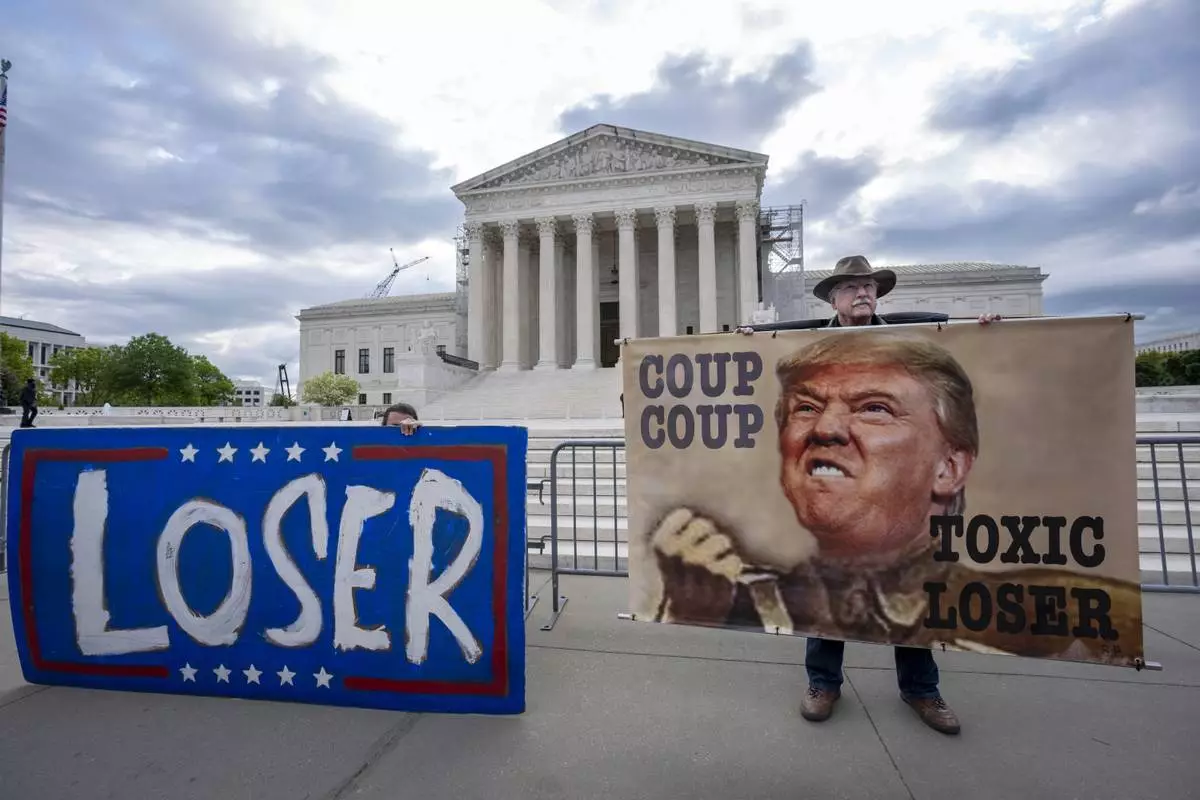
Activist Stephen Parlato of Boulder, Colo., right, joins other protesters outside the Supreme Court as the justices prepare to hear arguments over whether Donald Trump is immune from prosecution in a case charging him with plotting to overturn the results of the 2020 presidential election, on Capitol Hill in Washington, Thursday, April 25, 2024. (AP Photo/J. Scott Applewhite)
.jpg.webp)

.jpg.webp)
.jpg.webp)
.jpg.webp)
.jpg.webp)
.jpg.webp)
.jpg.webp)













